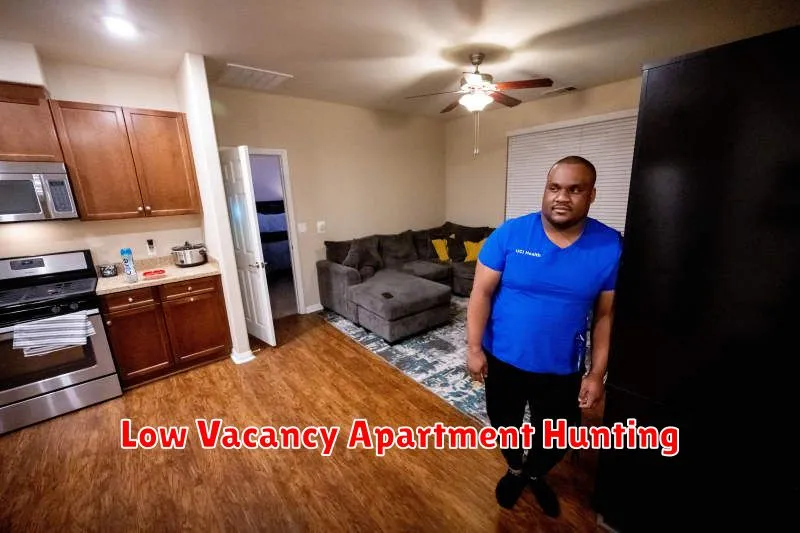Finding an apartment can be a stressful process, but it can feel downright impossible in a low-vacancy market. When inventory is low and demand is high, you might find yourself facing long waitlists, bidding wars, and sky-high rents. But don’t despair! With the right approach, you can still find a great apartment that fits your budget and needs, even in a competitive market. In this article, we’ll outline some key strategies for navigating a low-vacancy rental market and securing your dream apartment.
Understanding Low-Vacancy Markets
A low-vacancy market means that there are very few available apartments compared to the number of people looking for them. This is often a sign of a strong economy and a desirable place to live, but it also presents challenges for apartment hunters. When vacancy rates are low, competition for apartments is high, which means that prices can be higher, and it may take longer to find a place.
There are a few factors that can contribute to a low-vacancy market, including:
- Population growth: When more people are moving into an area, the demand for housing increases.
- Strong job market: A strong job market attracts new residents, leading to higher demand for housing.
- Limited new construction: If there isn’t enough new housing being built to keep up with population growth, vacancy rates will fall.
- High rental demand: Even if new construction keeps pace with population growth, if a large portion of the population prefers to rent, vacancy rates may still be low.
It’s important to be aware of a market’s vacancy rate when searching for an apartment. Understanding the market dynamics will help you plan your search and be prepared for the challenges you may face.
Start Your Search Early and Be Prepared
In a low-vacancy market, finding an apartment can feel like a race against time. The key to winning this race is to start your search early. Give yourself ample time to explore options, compare prices, and navigate the competitive landscape.
Beyond starting early, being prepared is crucial. Know your budget, desired amenities, and ideal location. Compile a list of potential properties and get pre-approved for a mortgage or rental loan. Having a solid understanding of your requirements and financial capabilities will streamline the process and make you a more attractive applicant.
Expand Your Search Area
When apartment vacancies are low, competition for rentals is fierce. You might need to broaden your search to find the right place. This could mean being flexible about your preferred location. Consider expanding your search to nearby neighborhoods or even to a different city altogether, especially if you’re willing to commute. Consider if you’d be open to living further away from your job or school.
Think about what’s most important to you. If you’re willing to give up a few amenities or a smaller living space, you may find more options. For example, you might be able to find a studio apartment in a more central location, or a larger apartment in a less desirable neighborhood.
Also, consider looking beyond traditional apartment buildings. Some landlords offer single-family homes or townhouses for rent. You can also explore websites that list rentals by owner, which may not always be advertised on major rental platforms.
Be Flexible with Your Criteria
In a low-vacancy market, finding an apartment can be a challenge. Competition is high, and landlords can be more selective. To increase your chances of success, you need to be flexible with your criteria. If you’re set on a specific neighborhood or a certain number of bedrooms, you might find yourself stuck in a bidding war or with few options. Instead, consider these strategies:
Expand your search area: Look at neighborhoods that may not be your first choice but are within a reasonable commute to work or other important locations. You might find a great deal in a slightly less popular area.
Be open to different apartment types: If you’re set on a one-bedroom apartment, consider a studio or a two-bedroom unit. There may be more availability in alternative layouts. You can also look at different building types, such as a condo or townhome.
Consider different amenities: Don’t get hung up on having a washer and dryer in the unit or a rooftop pool. These amenities may be nice, but they’re often negotiable.
Be flexible with your budget: If you’re at the top of your price range, consider slightly increasing your budget or looking for a unit that’s a few hundred dollars below your target. This can give you more leverage in negotiations.
Network and Utilize Your Connections
In a competitive housing market, sometimes you need to rely on your network to find the right place. Don’t be afraid to reach out to friends, family, and colleagues to see if anyone has any leads. You can also join local Facebook groups, forums, and online communities where people share information about housing and rentals. Let everyone know you’re looking and see who might be able to help. You never know what connections you may have that can lead to an opportunity. Be sure to use your network and make the most of it.
Use Multiple Online Platforms and Resources
In a low-vacancy market, competition for apartments can be fierce. To increase your chances of finding a suitable place, it’s crucial to utilize multiple online platforms and resources. Don’t limit yourself to just one or two websites, as the availability of listings can vary significantly. Explore a range of options, including:
- General apartment search websites: Sites like Apartments.com, Zillow, and Trulia offer vast databases of rental listings.
- Local real estate websites: Check out websites dedicated to your specific city or region, as they often have more localized listings.
- Craigslist: While it can sometimes be unreliable, Craigslist can be a good source for finding listings, especially for smaller or more unique apartments.
- Social media platforms: Many landlords or property managers advertise available units on Facebook, Instagram, and other social media platforms. Follow relevant groups and pages to stay informed.
- Direct contact with property management companies: Research property management companies in your desired area and reach out to them directly. They may have listings not yet advertised online.
By casting a wide net and utilizing various online platforms and resources, you’ll significantly increase your chances of finding the perfect apartment in a competitive market.
Contact Property Management Companies Directly
In a low-vacancy market, it can be challenging to find an apartment. However, don’t get discouraged. Many property management companies have websites where you can browse their available listings, contact them directly, or even sign up for email alerts for new listings. This allows you to stay ahead of the curve and potentially be among the first to see new units.
Not only can you find available units on their websites, but also directly contacting property management companies allows you to inquire about units that may not be publicly advertised. They may have units that are under renovation or are soon to be vacant, which may not be listed on their websites or other platforms. This direct approach can give you a significant edge in your search.
Property management companies appreciate proactive renters. By reaching out and expressing your interest, you showcase your commitment and increase your chances of securing a unit. Be polite and professional when contacting them. Be clear about your desired location, budget, and moving timeline. Your initiative and clear communication will leave a positive impression.
Consider Short-Term Leases or Sublets
In a low-vacancy market, finding a traditional long-term lease can feel like an uphill battle. A great option to consider is seeking out short-term leases or sublets. These arrangements offer greater flexibility and can be a lifeline in a competitive market.
Short-term leases usually span a period of a few months to a year. They often appeal to individuals who need temporary housing or are transitioning between locations.
Sublets involve renting a space from an existing tenant who is temporarily relocating or needs to reduce their housing costs.
While finding these options may require more legwork and networking, they can be worth the effort. Here are some strategies:
- Check with universities and colleges: Students often sublet their apartments during breaks or when they graduate.
- Browse online marketplaces: Websites like Craigslist and Facebook Marketplace are popular for finding sublets.
- Engage with your network: Let friends, family, and colleagues know you’re looking.
Remember to thoroughly research any potential landlord or subletter and carefully review all lease agreements.
Prepare a Strong Application Package
In a low-vacancy market, competition for apartments is fierce. To stand out from the crowd, you need to present a strong application package. This means having all the required documents in order, being transparent about your financial situation, and highlighting your strengths as a tenant. Here are some key things to keep in mind:
Complete all required documents: This includes a rental application, credit report, proof of income, and references. Make sure all your information is accurate and up-to-date. Any gaps or inconsistencies can raise red flags for landlords.
Demonstrate financial stability: Landlords are looking for tenants who can consistently pay rent on time. Provide clear documentation of your income, such as pay stubs or bank statements. If you have a good credit history, be sure to include a credit report.
Highlight your positive attributes: Your application is your chance to showcase why you’d be an ideal tenant. In a cover letter or personal statement, explain your rental history, your responsible nature, and any other relevant information that makes you a desirable tenant.
Be proactive: Once you’ve submitted your application, follow up with the landlord or property manager to check on the status. Expressing genuine interest and remaining in communication can make you stand out.
A strong application package is your best weapon in a low-vacancy market. By demonstrating financial stability, presenting a complete package, and highlighting your positive attributes, you’ll increase your chances of securing the apartment you want.
Be Ready to Act Quickly
In a low-vacancy market, competition for apartments is fierce. Landlords have a lot of options, and they can be selective about who they rent to. This means that you need to be ready to act quickly if you find an apartment that you like. This includes being prepared to apply right away, possibly even before you’ve seen the apartment in person. It’s essential to gather all necessary documents, including your credit report, pay stubs, and references, before starting your search so you can submit them quickly.
Be prepared to make a decision on the spot. If you wait around, you may find that the apartment has already been rented to someone else. You might also be required to pay a security deposit or first month’s rent to secure the apartment. Don’t be afraid to ask questions about the application process and the lease terms. The more you know about the apartment and the landlord, the better equipped you will be to make an informed decision.
Negotiate Effectively

In a low-vacancy market, you’re going to have to be a skilled negotiator. This is the time to use your charm and leverage your strengths to get the best deal. Here’s how to negotiate effectively:
First, be prepared. Research the market and know what rents are typical for similar units in your area. This will help you understand what a fair price is and avoid overpaying.
Second, be flexible. While you might have your dream apartment in mind, be open to considering other options, such as a slightly smaller unit or one in a less desirable location. This can increase your chances of securing a lease.
Third, be polite and professional. Your negotiation skills are important, but don’t forget that you’re also building a relationship with your future landlord. Show respect and treat them as you would like to be treated.
Finally, don’t be afraid to walk away. If you can’t reach an agreement that you’re comfortable with, don’t be afraid to move on to another option. It’s better to find an apartment that you’re happy with than to settle for something less than ideal.
Don’t Give Up!

It can feel discouraging to search for an apartment in a low-vacancy market, but don’t give up! With a little patience and persistence, you’ll find the perfect place. Remember that you’re not alone in this search, and many others are facing similar challenges. Stay focused, keep an open mind, and don’t be afraid to ask for help.
One of the most important things to remember is that finding an apartment is a process. It takes time and effort, and you may need to make some compromises along the way. Don’t be afraid to set realistic expectations and be flexible with your search criteria.
If you’re feeling discouraged, take a break from your search and re-evaluate your priorities. What’s most important to you in an apartment? What are you willing to compromise on? Once you’ve taken some time to reflect, you can return to your search with renewed energy and focus.
Consider a Rental Agent

In a low-vacancy market, finding an apartment can feel like a race against time. Rental agents can be a valuable asset in this situation. They have access to listings that aren’t publicly available, they know the market inside and out, and they can negotiate on your behalf.
A good rental agent will understand your needs and budget, and they’ll work tirelessly to find you the perfect apartment. They can also help you navigate the application process and avoid common pitfalls.
While working with a rental agent might come with a fee, the benefits often outweigh the cost. They can save you time, stress, and potentially money in the long run by helping you find the right apartment at a fair price.

